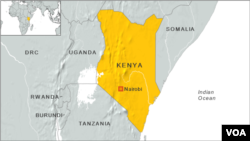Researchers in Kenya are reporting major success in the large-scale trial of a new pneumonia vaccine.
The vaccine, PCV-10, was given to 35,000 children in the town of Kilifi over a period of seven years. Eighty percent of these children showed stronger resistance to pneumonia once the vaccine was administered.
Martin Ota, a research officer with the World Health Organization, was among those present when the results were unveiled Wednesday at a meeting in Nairobi Wednesday. He said the vaccine should go into circulation immediately.
“The results are a delight to see," Ota said. "They are having tremendous impact, and this impact is not only directly on the children who have received the vaccine. They are also protecting other children who did not receive the vaccine, as well as in adults. So in my opinion this vaccine has had tremendous impact and should be encouraged to be used.”
Pneumonia is an acute respiratory infection that affects the lungs. According to the WHO, it kills more than 930,000 children under age 5 each year.
In Kenya, the illness killed more than 16,000 people as recently as 2000, although the annual number has declined somewhat.
Tabitha Mwangi, a lecturer at Pwani University in Mombasa, nearly lost her son Mathew to pneumonia seven years ago. She considers herself lucky that a local hospital was able to save him.
“When we got in, immediately he got oxygen," she said. "Now, you go to a lot of hospitals, there’s no oxygen; you go to a lot of hospitals they're out of antibiotics. So we were lucky. We went to a hospital where there was oxygen and there was antibiotics, and he was immediately put on treatment. I think things are getting better with the vaccine being available and all the children will be vaccinated.”
Kenya's Ministry of Health began the trial in 2011, with funding provided by Gavi, a Geneva-based group that works to increase access to new and underused vaccines.
The trial results were studied by researchers at the Kenya Medical Research Institute. Professor Anthony Scott, a senior scientist at KEMRI, raved about the impact of the new vaccine.
“We are seeing somewhere between a 95 and 100 percent reduction in the number of cases of invasive pneumococcal disease — that is, either pneumonia or meningitis, where the bacteria spreads into the bloodstream — and that is a very dangerous form. So the vaccine has a profound effect on the most severe type of pneumococcal disease, and it also is reducing the burden of pneumonia in hospitals.”
Kenyan authorities now plan to give the vaccine to babies nationwide, in three doses at 6, 10 and 14 weeks.




